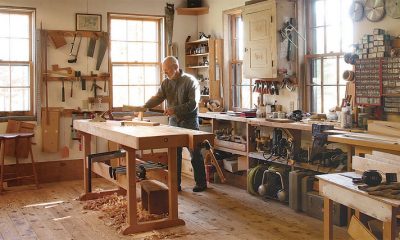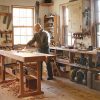There’s an old saying that goes like this – “Anything worth doing is worth doing right”. A corollary to that saying is the recognition that getting the job done right requires the right set of tools. If you’ve just started building up your workshop from scratch, aren’t sure which hand tools you need, but are afraid of overspending, then keep reading. In this article I’ll talk about the essential hand tools for any workshop, as well as how to find them at affordable prices.
There are literally thousands of unique workshop hand tools you can find both online and in hardware stores, so the buying process might be a bit complicated for beginners. In order to simplify it, there are a few things to consider before shopping.

First off, look for sales. Find a few websites that sell tools and bookmark them. Check each and every one of them on regular basis and wait for a hand tool sale, when the prices are significantly lower than usually. This will save you a lot of money in the long run, you only need to have the patience and spot a good deal on a tool sale.
Secondly, buy only what you need for your current projects and the projects you plan on doing in the near future. There’s no need for you to invest in high-end complex tools and equipment that you can’t use in most of your projects, or you have no experience in using right. A lot of the tools can put you in harms way if not handled properly, so give yourself time to learn and improve. Here’s a list of the most essential hand tools.
Measuring Tools
For most projects, you’ll typically need a few measuring tools like a measuring tape, which can come in a variety of lengths. The longer the tape is, the heavier. Another measuring tool you might want to invest in is a level. Levels come in a variety of lengths, styles and sizes. The basic level type uses a liquid-filled container with a bubble and a straight edge. The bubble is lined between the markings on the liquid tube to determine when a line or surface is level.
Hammers
Depending on the use, hammers come in a variety of styles. Most commonly used hammers include standard nailing hammers and tack hammers. Some other types include a rubber mallet, which is particularly useful for woodworking to make fit adjustments without spoiling the surface of the wood. Dead-blow hammers are also useful, as they don’t bounce back when struck against a material.
Screwdrivers and Wrenches
These tools are extremely versatile and every toolbox and workshop needs them. Screwdrivers come in slotted and Phillips head forms, and each of them comes in an array of sizes. There are other types of screwdrivers as well, which are used for more specialized uses, like the torx and hex head. They can have interchangeable attachments which adds to their versatility.
Wrenches are adjustable tools which are extremely useful in workshops, as well as around the house. The open-end wrenches are available in both imperial and metric sizes, and are open at both ends. The closed type of wrenches are called box wrenches. However, there are combination wrenches which are closed at one end and open at the other.





















You must be logged in to post a comment Login